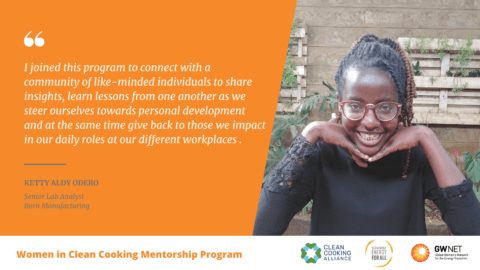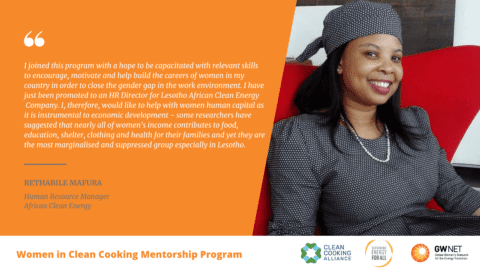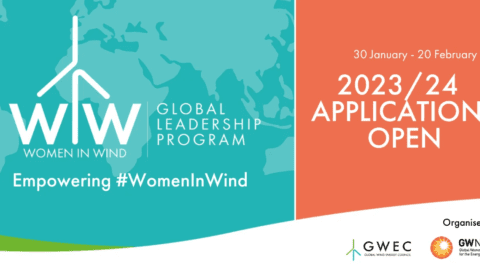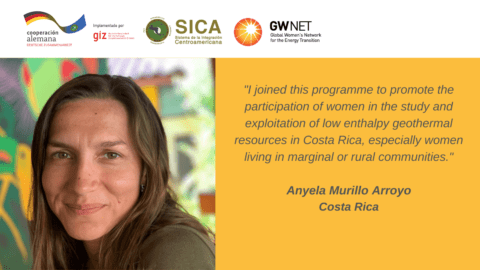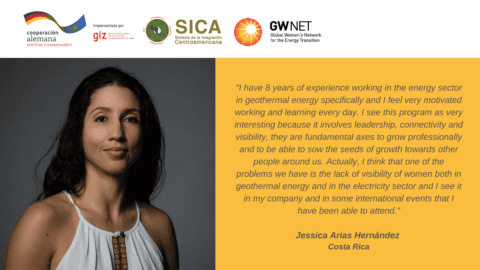GWNET brings you the 8th instalment of the “Meet the Women in the SICA Energy Transition” series which celebrates the work and achievements of the women who are part of the Women in the SICA Energy Transition Mentoring Programme. This programme is made up of 38 mentee-mentor tandems, with mentees from 7 countries. Meet SICA mentee, Shidia María Matute Agurcia, Operation Programming Analyst Engineer at the National Electrical System Operator (ODS) in Honduras.
1) Tell us a little about yourself. What do you love most about what you do?
I’m an industrial electrical engineer working as a programming analyst engineer for the Operation of the Honduran National Electric System.
What I like most about my job is contributing to the optimal operation of the system, always seeking to satisfy the demand for electricity through the best use of energy resources and with the least possible environmental and economic impact.
2) What were your goals when you started working in the energy sector? How have these evolved?
When I started working in the energy sector, my main objective was to know the characteristics of the Honduran electricity system, its topology, its energy matrix, its network restrictions, the current applicable regulations, etc.
Now that I know a little more about it and how it operates with the regional electricity system, I am interested in improving my skills in simulation software and programming languages that allow me to contribute in a better way to the identification and resolution of specific problems presented in both programming and real-time operation.
3) What are the opportunities for sustainable energy in your country?
In Honduras, sustainable energy has been well accepted, so much so that by 2021 there will be around 65% of installed capacity in renewable energy (hydroelectric, solar, wind, biomass and geothermal).
To continue increasing this percentage it will first be necessary to strengthen the national interconnected system so that it is viable to transport all this renewable generation to the centres with the highest electrical energy consumption.
The biggest challenge that I have had to face is having to define processes and procedures regarding the different tasks that the current regulations assign to the department and position I occupy. This is due to the current transition that the country’s energy sector is already experiencing. With the recent creation of the company for which I work, so many of the tasks that we are responsible for developing and fulfilling are new for the sector, the company and the staff.
I have managed to overcome this in the best possible way due to the support of senior personnel in the company and sector and thanks to the training that the company has conveniently provided, which has built my knowledge and experience in various topics.
In 5 years, I want to be in a professional decision-making position that allows me to contribute more directly to the better functioning of the Honduran electrical system and its operation in conjunction with the regional power system. The mentoring program will allow me to increase my knowledge in the energy sector and gain experience on how other systems operate worldwide, thus allowing me to improve my professional profile and in this way continue to scale in the sector.
6) What advice would you give to women hoping to join the sustainable energy sector?
To all women who want to join the energy sector, I encourage you to do so.
Always have a positive mind, know that you have the power to achieve everything that is proposed, discover the area of the sector in which you would like to specialize, and investigate and learn about it (there are many ways to learn and more in this digital age).
Today there is a lot of free access software and video tutorials that you can learn from. Also, acquire knowledge of programming languages and last but not least take advantage of all the opportunities to make friends and contacts with people who are already developing in the sector.
Read more about GWNET’s mentoring programmes here.


